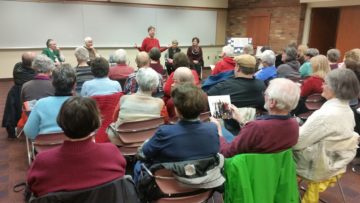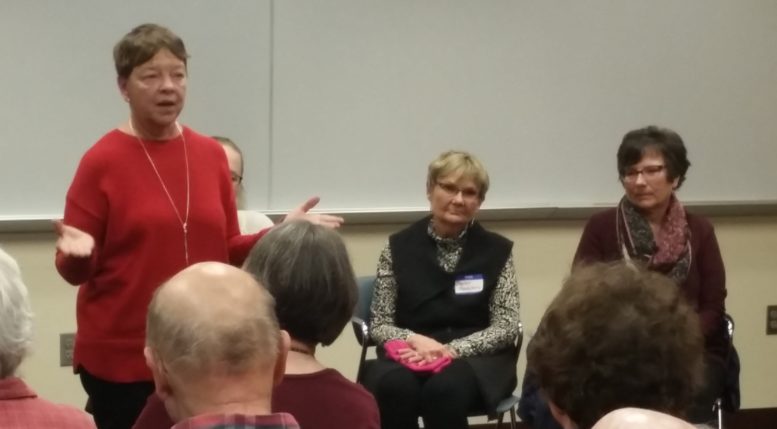By JAN LARSON McLAUGHLIN
BG Independent News
These were not crazed feminists shrieking about their rights. These were librarians, teachers, nurses – many retired – who are motivated to march and to make a difference in today’s rapidly changing U.S. under President Donald Trump.
This was not a radical group, but rather the Bowling Green League of Women Voters, who spent the evening talking about how they can fight back.
They listened to stories from other “spunky” women who joined in the Women’s Marches across the U.S. And then they faced an uncomfortable question.
“Do you think it made a difference?” one woman in the audience asked. “Was anybody listening who should have been listening?”
While the responses may have lacked certainty, they were full of hope.
“It’s very hard right now to see if it’s going to make a difference,” said Martha Turnwald-Fether, a retired school administrator who marched in Washington, D.C. But she added that even though Trump didn’t acknowledge the massive march, it had to bother him to have that many people marching in his front yard.
“You see that many people, and you think, how did we lose?”
So the roomful of women, and a handful of men, brainstormed on how to make sure the march mattered. “What do we do next?” one woman asked. Some of the suggestions were:
- Encourage people to vote.
- Quit listening to “alternative facts” and urge others to do the same.
- Help find good candidates.
- Work to redistrict and end gerrymandering districts.
- Support good journalism that is trustworthy.
- Donate money to good candidates.
- Have polite but firm conversations with elected officials.
- Let politicians know what you think, through calls, visits to their offices, letters or emails.
- Join local groups that are working together for change, such as Indivisible District 5.
One marcher, Heather Paramore, suggested that local residents will need to step outside their comfort zones to make a difference.
“Change doesn’t happen when you’re comfortable,” she said.
Women may have to march more, said Marilyn Bowlus, of Pemberville.
“I don’t need to go to a gym anymore,” said Bowlus, who has participated in several marches. “I’ve become a marcher, a professional marcher.”
“I realized this was always me, but I got lost for awhile,” she said.

League of Women Voters in Bowling Green discusses the women’s marches.
Women also need to stand up for real facts, said Penny Evans-Meyer, of Bowling Green. When others spread falsehoods about the government supporting abortions through Planned Parenthood, people need to speak up and say that’s untrue. “Outside of this room, I’m not sure if people know that,” she said.
Women were also encouraged to not give up.
“Since the election, I’ve been really depressed and wondering what I can do,” said Joanne Navin, a nurse practitioner who marched in Washington, D.C. “It was really quite an experience – something I never expected.”
Navin remembered looking at the mass of women on the mall and thinking, “This is America. I know if we could keep that spirit going, we can make a change.”
Paramore, an advocate for women at the Cocoon program, was present for Trump’s inauguration and then for the Women’s March the following day. “I got to see two totally different sides of America.”
“You could barely move an inch without running into somebody,” she said of the larger march.
It’s not a feeling that can be forgotten, said Sandy Rowland, a Bowling Green City Council member who marched in Ann Arbor.
“It brought back the feeling when I was watching TV and I saw Armstrong walk on the moon,” she said.
Paramore cautioned about women becoming complacent. “It’s not over. We have to keep fighting,” she said. “As a white woman, it’s easy for me to become complacent.”
Turnwald-Fether said she initially feared the marches would be made up of just older women. “Trump will have a heyday with that,” she recalled thinking.
But young women turned out to march as well. “That gave me hope,” Turnwald-Fether said. “I will continue to keep marching.”

